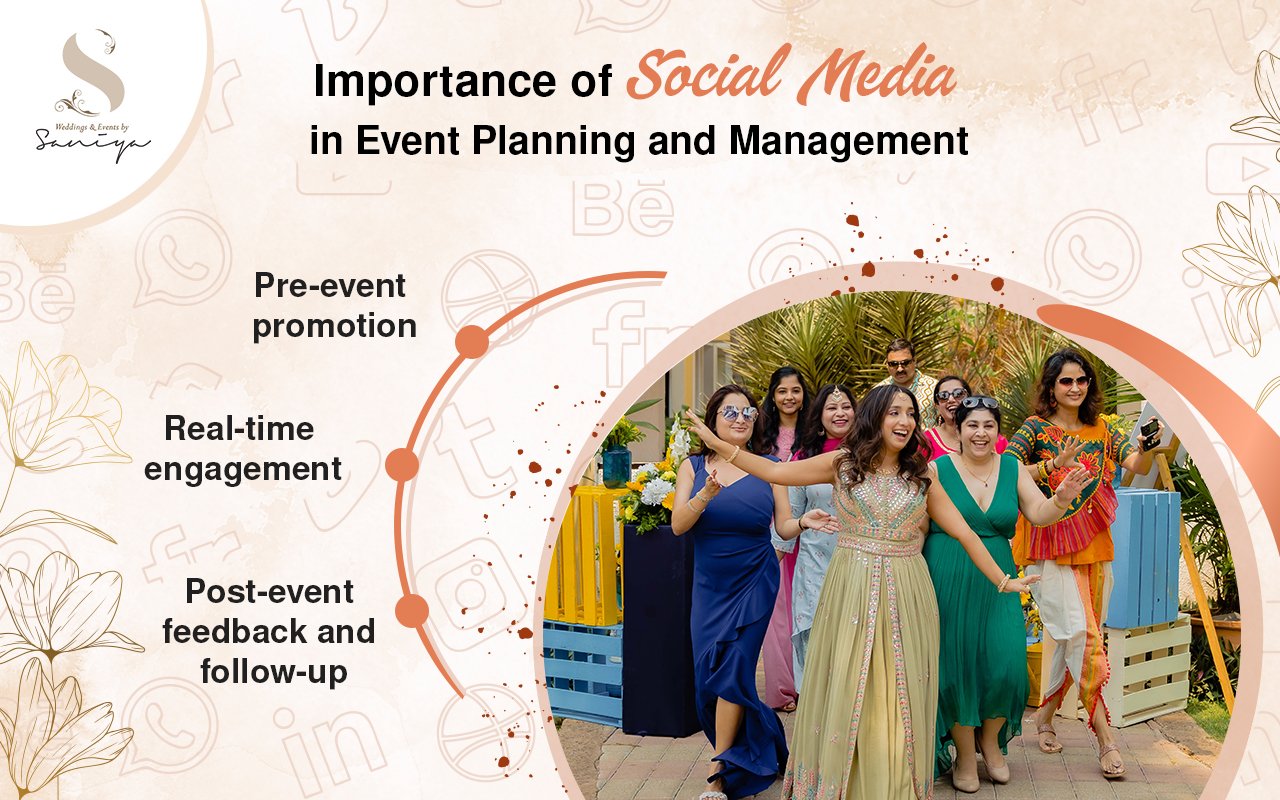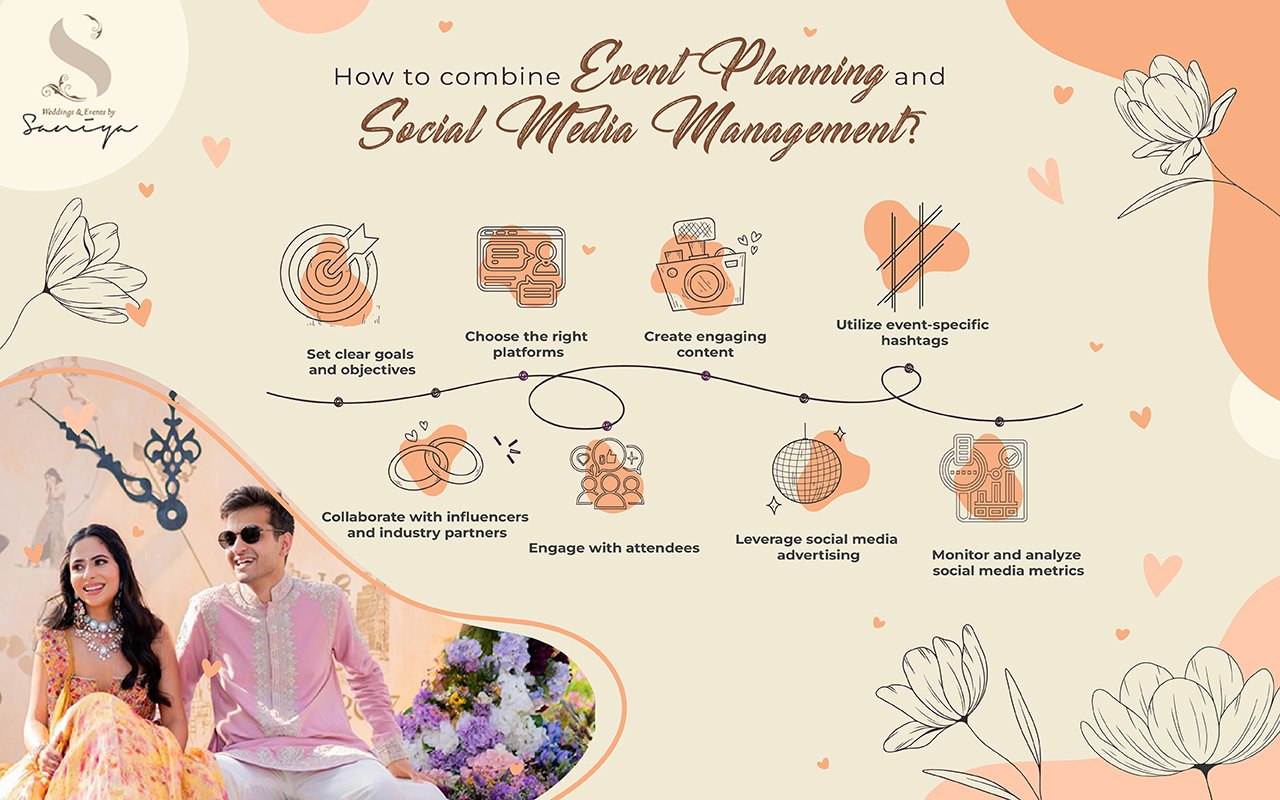
22 Jun Importance of Social Media in Event Planning and Management
Social media in event planning has become increasingly important, as it offers numerous benefits and opportunities for event organizers. By integrating social media into event planning strategies, event planners can effectively promote their events, engage with attendees, and enhance overall event experiences. Social media has transformed the way event planning is approached, providing event organizers with powerful tools to reach a wider audience and enhance attendee engagement. Incorporating social media into event planning strategies allows event organizers to leverage their reach, engagement, and real-time communication capabilities. Social media platforms serve as channels to promote events, share updates, and facilitate conversations among attendees. Developing a comprehensive social media plan specifically tailored for events is essential for effective promotion and management. E.g. Facebook offers event planning features that allows organizers to create event pages, share event details, and engage with potential attendees. Utilizing Facebook’s event planning capabilities enables event organizers to leverage the platform’s extensive user base and advertising features.
Social media provides a multitude of creative ideas for promoting events, such as running contests, sharing teaser videos, or collaborating with influencers. Crafting a well-defined social media strategy ensures that event promotion efforts are targeted, impactful, and aligned with event goals. Leveraging social media platforms for event promotion helps generate buzz, increase event attendance, and encourage attendee interaction. Sharing engaging and informative social media posts related to the event can pique interest, provide updates, and highlight key aspects of the event. Social media serves as a powerful marketing tool for events, enabling event organizers to effectively target and engage their desired audience. Social media platforms also provide opportunities for event planners to create compelling advertisements and reach a broader audience.
Understanding the best practices and strategies for utilizing social media in event promotion can significantly enhance an event’s visibility and success. Thinking outside the box and employing innovative tactics can make event promotion on social media more captivating and impactful.
Events by Saniya recognizes that social media has become an integral part of our daily lives. It has transformed how we communicate, share information, and connect. In event planning and management, social media platforms have emerged as powerful tools that provide numerous benefits and opportunities. They enable event planners to reach a wider audience, engage with attendees, build excitement, and enhance overall event experiences.
In today’s digital age, social media has revolutionized the way people access and consume information. Event planners can leverage the power of social media to promote their events, increase attendance, and engage with potential attendees in real time.
Most Popular Social Media Platforms For Events
Events by Saniya use these popular social media platforms for their events:
- Facebook: With over 2.8 billion monthly active users, Facebook is an essential platform for event promotion. Event planners can create dedicated event pages, share event details, engage with potential attendees through posts and comments, and utilize Facebook’s advertising features to target specific demographics.
- Twitter: Twitter’s real-time nature makes it a valuable platform for event updates, live discussions, and engagement. Event planners can create event-specific hashtags, share updates, retweet attendee content, and interact with participants during the event.
- Instagram: Instagram’s visually focused platform is ideal for showcasing event highlights, behind-the-scenes content, and engaging visuals. Event planners can create event-specific hashtags, share photos and videos, collaborate with influencers, and encourage attendees to share their experiences using event hashtags.
Error: No data found, Try connecting an account first and make sure you have posts on your account.
Error: Error validating application
- LinkedIn: LinkedIn is beneficial for professional events, conferences, and networking opportunities. Event planners can create event pages, share industry-specific content, connect with potential attendees and speakers, and utilize LinkedIn’s advertising capabilities to target professionals.
Importance of Social Media in Event Planning and Management:
Social media plays a crucial role in various stages of event planning and management. Here are some key aspects where social media demonstrates its importance:

- Pre-event promotion: Social media platforms allow event planners to create buzz and generate excitement before the event. They can share event details, speaker profiles, agenda highlights, and exclusive offers to attract potential attendees. By utilizing targeted advertising and influencer collaborations, event planners can effectively reach their target audience and encourage registration.
- Real-time engagement: During the event, social media enables event planners to engage with attendees in real time. They can share live updates, photos, and videos, respond to attendees’ queries and comments, and encourage attendees to interact with each other using event-specific hashtags. This fosters a sense of community and enhances the attendee experience.
- Post-event feedback and follow-up: Social media platforms provide a space for attendees to share their feedback, opinions, and experiences after the event. Event planners can collect valuable insights, evaluate attendee satisfaction, and identify areas for improvement. Additionally, social media can be used for post-event follow-up, sharing event highlights, thanking attendees, and promoting future events.
How To Combine Event Planning And Social Media Management?

Events by Saniya feels that the real winner is that person who combines event planning and social media management. To effectively combine event planning and social media management, event planners should consider the following strategies:
- Set clear goals and objectives: Define the goals you want to achieve through social media, such as increasing event registrations, enhancing attendee engagement, or expanding brand awareness. Establishing clear objectives will guide your social media strategy and help measure success.
- Choose the right platforms: Identify the social media platforms that align with your target audience and event goals. Focus your efforts on platforms where your potential attendees are most active to maximize reach and engagement.
- Create engaging content: Develop compelling and shareable content that aligns with your event’s theme and objectives. Utilize various formats such as photos, videos, live streams, and infographics to capture attendees’ attention and generate excitement.
- Utilize event-specific hashtags: Create unique hashtags for your event to encourage attendees to share their experiences and generate user-generated content. Use these hashtags in your social media posts, signage, and marketing materials to increase their visibility.
- Collaborate with influencers and industry partners: Partner with influencers, industry experts, and relevant organizations to amplify your event’s reach. Encourage them to share information about your event, create engaging content, and offer exclusive promotions to their followers.
- Engage with attendees: Actively engage with attendees on social media by responding to their comments, questions, and concerns. Encourage attendees to share their experiences, ask questions, and interact with each other, fostering a sense of community and excitement around the event.
- Leverage social media advertising: Utilize the targeted advertising features provided by social media platforms to reach your desired audience effectively. Narrow down your target demographics based on location, interests, profession, or other relevant factors to optimize your advertising efforts.
- Monitor and analyze social media metrics: Regularly monitor and analyze social media metrics such as reach, engagement, and conversions to evaluate the success of your social media efforts. Use these insights to refine your strategy and make data-driven decisions for future events.
Events by Saniya emphasizes that social media has become an indispensable tool for event planning and management. It offers event planners an extended reach, enhances attendee engagement, provides real-time updates, and enables valuable feedback. By effectively combining event planning and social media management, event organizers can leverage the power of social media platforms to create memorable experiences, increase event attendance, and build a loyal community of attendees. Embracing social media as an integral part of event planning strategies is crucial in today’s digital landscape for successful and impactful events.
Frequently Asked Questions
Q1. How to promote an event on social media?
Promoting an event on social media requires a well-planned strategy and creative tactics to effectively reach and engage your target audience. Here are some steps to promote an event on social media:
- Define your target audience: Clearly identify the demographic and interests of your target audience. This will help you tailor your social media content and select the appropriate platforms to reach them.
- Create a dedicated event hashtag: Develop a unique and memorable hashtag specifically for your event. Encourage attendees, sponsors, and participants to use the hashtag in their social media posts related to the event. This will help generate buzz and make it easy to track event-related conversations.
- Create compelling content: Develop engaging and informative content that highlights the key aspects of your event. This can include teaser videos, behind-the-scenes photos, speaker profiles, agenda highlights, and exclusive offers. Use visual content, such as images and videos, to capture attention and create excitement.
- Utilize various social media platforms: Identify the social media platforms where your target audience is most active and allocate your resources accordingly. Popular platforms for event promotion include Facebook, Twitter, Instagram, LinkedIn, and YouTube. Tailor your content and strategies to each platform’s unique features and audience preferences.
- Leverage influencer partnerships: Collaborate with influencers, industry experts, and relevant organizations to expand your event’s reach. Partner with influencers who align with your event’s theme and have a significant following in your target audience. They can share event details, create engaging content, and promote your event to their followers.
- Utilize targeted advertising: Take advantage of the targeted advertising features offered by social media platforms to reach your desired audience effectively. Narrow down your targeting options based on demographics, interests, location, and behaviors. This will ensure that your event promotions are shown to the most relevant audience.
- Engage with your audience: Actively engage with your audience by responding to comments, questions, and messages. Encourage attendees and participants to share their excitement and experiences related to the event using your event hashtag. This creates a sense of community and fosters attendee engagement.
- Run contests and giveaways: Organize social media contests or giveaways to create excitement and encourage participation. This can include ticket giveaways, exclusive access to event perks, or merchandise. Encourage participants to share the contest or giveaway on their own social media profiles, increasing the event’s visibility.
- Collaborate with event sponsors and partners: Work closely with event sponsors and partners to cross-promote the event on their social media channels. This can include sharing event details, offering exclusive discounts or incentives, and highlighting their involvement. Collaborative efforts amplify the reach and impact of your event promotion.
- Track and analyze results: Monitor the performance of your social media campaigns by tracking key metrics such as reach, engagement, website clicks, and ticket sales. Use these insights to refine your strategies, identify successful tactics, and make data-driven decisions for future event promotions.
By following these steps and adapting your approach based on your specific event and target audience, you can effectively promote your event on social media and maximize attendee engagement and participation.
